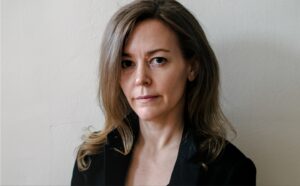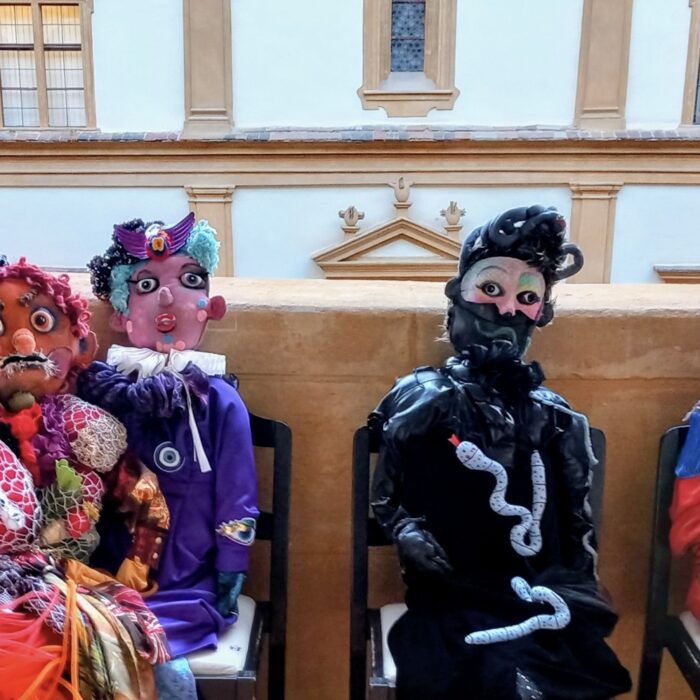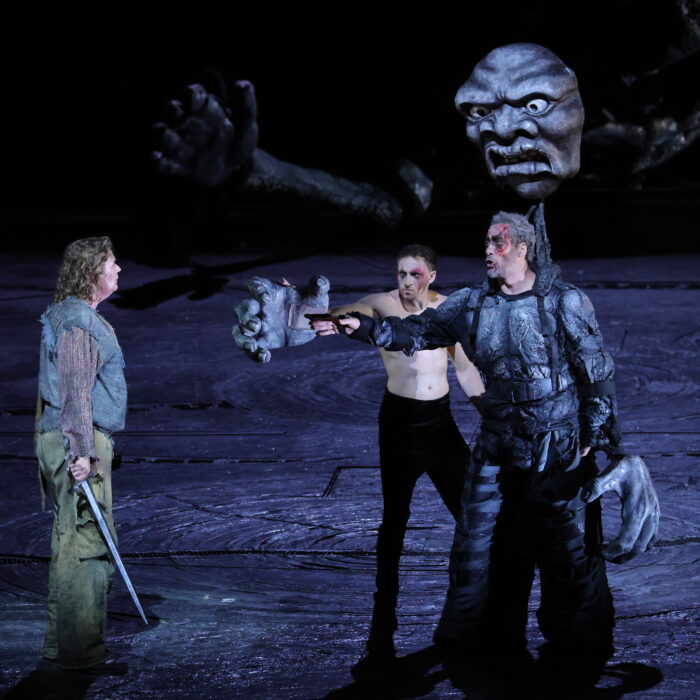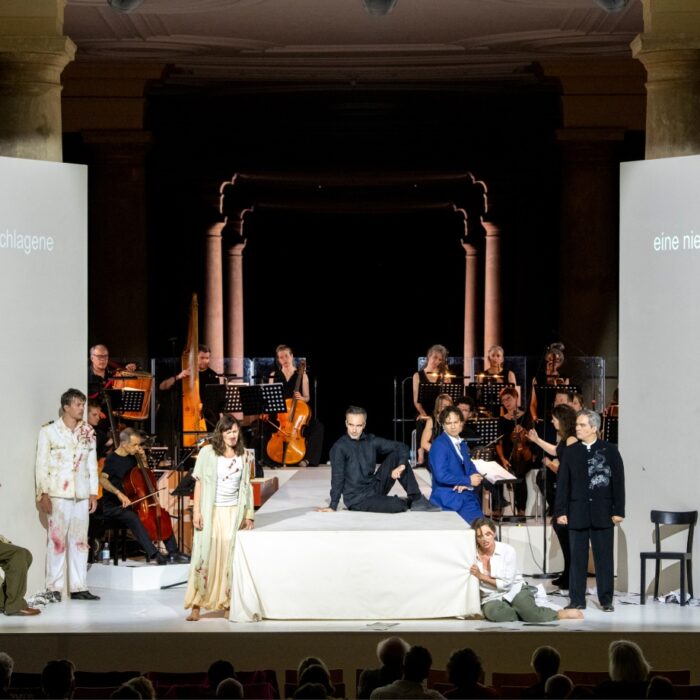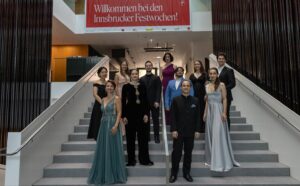
Innsbruck Festival of Early Music 2024 Review: The 15th Pietro Antonio Cesti Competition
Illuminating Young Voices with International Backgrounds Brings Early Music Into the Present
By Jennifer Pyron
(Photo credit: © Wibmer)
The Pietro Antonio Cesti Competition is a major annual highlight in the world of baroque opera that takes place at the Innsbruck Festival of Early Music, featuring young baroque singers from all over the world. This year’s competition was full of exciting and inspiring moments that OperaWire had the honor of experiencing live. The audience in the Great Hall at the House of Music also plays a significant adjudicatory role, in addition to the official jury, through their vote for the Audience Prize. After preliminary rounds, the young singers will compete at these finals for prizes. The Cesti Competition has launched several international singing careers, including last year’s winner, mezzo-soprano Mathilde Ortscheidt. While attending some of the preliminary rounds of this year’s competition, OperaWire learned more about what it takes to make it to the final round and how Early Music is being celebrated among young singers from various backgrounds.
Making the Final Decisions
The jury for this year’s competition included Anna Bonitatibus (mezzo-soprano), Andrea Cigni (director of the Teatro Ponchielli of Cremona and the Monteverdi Festival), Ottavio Dantone (conductor and musical director of the Innsbruck Festival of Early Music, and Accademia Bizantina), Vivica Genaux (mezzo-soprano), Henning Ruhe (artistic director of Göteborg Opera), Michael Schade (tenor and artistic director of the International Baroque Days at Melk Abbey), Sebastian Schwarz (jury chairman and artistic director of the Festival della Valle d’Itria), and Eitan Sorek (founder and managing director of Sorek Artists Management).
The young singer finalists included Ekaterina Chayka-Rubinstein (mezzo-soprano, Germany, 26 years), Maximiliano Danta (countertenor and mezzo-soprano, Uruguay, 31 years), Mara Gaudenzi (mezzo-soprano, Italy, 30 years), Jake Ingbar (countertenor, USA, 28 years), Jiayu Jin (soprano, China, 28 years), Lauren Lodge-Campbell (soprano, Australia, 31 years), Laura Orueta (mezzo-soprano, Spain, 31 years), Vojtěch Pelka (countertenor, Czech Republic, 24 years), Brenda Poupard (mezzo-soprano, France, 30 years), Angelo Testori (tenor, Italy, 28 years), and Lucija Varsic (mezzo-soprano, Croatia, 31 years).
The Talenti Vulcanici ensemble, featuring musical director and harpsichordist Stefano Demicheli, accompanied the singers and began the evening’s competition with a beautiful performance of Antonio Vivaldi’s “Il Giustino” (Allegro–Andante–Allegro). The ensemble featured musicians Maria Grokhotova (concertmaster); violinists Raffaele Nicoletti, Isabel Soteras Valenti, Karolina Habalo, Azusa Onishi, Giacomo Coletti, and Aki Takahashi; violists Clelia Gozzo and Sara Bagnati; cellists Anna Camporini and Celeste Casiraghi; lutist Laura La Vecchia; contrabassist Nicola Dal Maso; bassoonist Elena Bianchi; and oboists Guido Campana and Rei Ishizaka.
It is important to note that the following reviews of each young singer includes both arias together, while during the performance each singer only performed one aria in each half of the night’s presentation. The two arias chosen reflect the singers’ vocal agility, technique, dynamics, and talent, but are not limited to only these elements. There is a lot more than meets the eye when it comes to determining the final singers and the jury worked tirelessly every step of the way. The following reviews reflect only what OperaWire experienced in the audience during the one night of the finals.
Stellar Singing
Italian tenor Angelo Testori performed Vivaldi’s “Il piacer della vendetta” from “Il Giustino,” and Leonardo Vinci’s “Su le sponde del torbido Lete” from “Artaserse.” Testori’s vocal technique was supportive and consistent throughout both arias. His even tone during ornamentations propelled energy behind each note and his voice carried into the hall with ease, especially during the Vinci aria.
Uruguayan countertenor and mezzo-soprano Maximiliano Danta performed Leonardo Vinci’s “La rondinella, che a noi sen riede” from “La Rosmira fedele,” and Antonio Vivaldi’s “Sento in seno” from “Il Giustino.” Danta’s high energy and enthusiasm from the moment he walked onto the stage felt electric and grounded at the same time. There are very rare moments when such a magical combination occurs: this was definitely one of them. Both of his arias showcased his excellent vocal technique, precision of intonation—especially during ornamentations—, and a natural grace that uplifted the repertoire, making every note feel alive and present in the hall. There was never a moment where he waited for the next line or fell behind the engaging tempo of the accompanying ensemble. Instead, Danta extended his energy through his phrasing, making his singing feel effortless and fun. The artistry required to execute this well is one thing—the warm and engaging spirit it takes to spark a listener’s interest is another level entirely. Danta’s voice and two performances left the audience wanting more.
Australian soprano Lauren Lodge-Campbell performed Antonio Vivaldi’s “Senza l’amato ben” from “Il Giustino” and Handel’s “Voglio amare” from “Partenope.” Her voice exemplified an exquisite range of high notes that floated into the hall with clarity and profundity. Despite a false start at the beginning of her first aria, Lodge-Campbell did not let the pressure of the night get the best of her. She seemed to lean in more to the music and the purpose of her being onstage and in the moment. There was also a naturalness to her expressivity that created an attractiveness one cannot describe with words: a true “je ne sais quoi.” Her second aria, “Voglio amare,” brought forward her full lyric-coloratura range and delighted listeners with her vocal agility. Her vibrato was also well measured in every phrase, not too much and never too little. One felt privy to watching a very logical mind at work. I appreciated all the effort and attention to detail. Lodge-Campbell’s “Voglio amare” is ready to be fully staged immediately.
French mezzo-soprano Brenda Poupard performed Nicola Porpora’s “Mira in cielo” from “Arianna e Teseo” and Vivaldi’s “Vedrò con mio diletto” from “Il Giustino.” Her voice resonated warmly in the hall and indicated high potential for continued depth development. “Mira in cielo” featured Poupard’s vocal agility and “Vedrò con mio diletto” brought to life her intuitiveness. I am excited to see and hear Poupard perform in the future.
Spanish mezzo-soprano Laura Orueta performed Leonardo Vinci’s “La rondinella, che a noi sen riede” from “La Rosmira fedele” and Vivaldi’s “Sento in seno” from “lI Giustino.” Her voice sounded rich and focused in the hall, with even intonation and beautiful sustained notes, especially in “Sento in seno.”
Czech countertenor Vojtěch Pelka performed Vivaldi’s “Sul altar di questo nume” from “Il Giustino” and “Le belle immagini” from Christoph Willibald Gluck’s “Paride ed Elena.” Pelka’s dynamic vocal precision and storytelling proficiency in both arias made for two enriching performances. He sounded engaged with his vocal technique and breath support, and this created space for him to enjoy every word and note along the way. Pelka’s performances were savory experiences for the listener because they clearly delighted him as the singer and interpreter. He also has a magnetic stage presence that translated well in both arias. The audience really enjoyed his presence and his singing.
German mezzo-soprano Ekaterina Chayka-Rubinstein performed Popora’s “Mira in cielo” from “Arianna e Teseo” and Vivaldi’s “Vedrò con mio diletto” from “Il Giustino.” Her voice brought both arias to life and she was eye-catching at every moment. Chayka-Rubinstein’s mezzo displayed a rich lower register and her breath was evenly supported throughout. She completed her phrases with ease and every entrance was engaging. She developed her characters and managed to tell their stories in a short amount of time. I am excited to see what future roles Chayka-Rubinstein performs.
Croatian mezzo-soprano Lucija Varsic performed Vivaldi’s “Sento in seno” from “Il Giustino” and Porpora’s “Mira in cielo” from “Arianna e Teseo.” Varsic’s mezzo displayed agility and a beautiful range of colors, especially during “Mira in cielo” when her voice blossomed in full. The audience loved her!
Italian mezzo-soprano Mara Gaudenzi performed Vivaldi’s “Vedrò con mio diletto” from “Il Giustino” and Porpora’s “Mira in cielo” from “Arianna e Teseo.” Gaudenzi’s voice sounded rich and full of colors in the hall. Her interpretation of “Mira in cielo” really showed her voice’s depth and intuitiveness. Her middle range supported her throughout and made for many notable moments.
Minnesotan countertenor Jake Ingbar performed Vivaldi’s “Il mio cor già più non sa” from “Il Giustino” and Giovanni Alberto Ristori’s “Bellezze adorate” from “Le fate.” His voice’s crystalline lightness and silvery tone created breathtaking moments of radiance during both arias. His vocal technique was supportive all throughout and there was a consistent body of sound in the hall as he sang. It was a joy to hear Ingbar for my first time, and I really want to hear him sing “Akhnaten” in the future. Ingbar will be making his Carnegie Hall debut this season with the Cecilia Chorus of New York to sing Bach and Bernstein with conductor Mark Shapiro. He was also on the roster for the Met Opera during last season’s production of John Adams’ “El Niño” as countertenor two coverage.
Chinese soprano Jiayu Jin performed Gluck’s “Non sperar, non lusingarti” from “Le cinesi” and Vivaldi’s “Mio dolce amato sposo” from “Il Giustino.” Jin’s soprano sounded extraordinary in the hall. Her high notes were spectacular and her vocal phrasing was consistent throughout. She excelled at really telling the story behind each aria and was a joy to experience live. Her vocal agility, especially during “Non sperar, non lusingarti,” highlighted her natural vocal dynamism and gift for singing. Her stage presence is captivating and she proved to be a powerhouse of vocal technique. The exactness of her notes added to her ornamentations in exciting ways and I felt like I was hearing both arias for the very first time. Her interpretation of “Mio dolce amato sposo” was superb!
Announcing the Winners
The winner of this season’s 15th Cesti Competition of the Innsbruck Festival of Early Music was countertenor Maximiliano Danta. Second prize was awarded to Jiayu Jin. Third prize was awarded to Brenda Poupard. The Audience Award was awarded to Vojtěch Pelka, and the Young Artist Award was awarded to Ekaterina Chayka-Rubinstein. OperaWire has also reported, in addition to the main prize winners, that several of the finalists received other prizes and engagements. Soprano Lauren Lodge-Campbell was promptly hired by Il Gusto Barocco and Jörg Halubek while Lucjia Varsic was awarded a place in the 2025 Masterclass with Anna Bonitatibus as well as a medal award from Radio Kalssik Stephansdom.
On behalf of OperaWire, we want to congratulate every applicant and participant of this competition. Experiencing just a fraction of the hard work, travel, and effort that is required, not to mention the engagement with your instrument and fellow musicians, is a celebration in itself. We wish everyone the absolute best. We are thrilled to see your beginnings and excited to be part of your exciting futures! Bravissimo to all!
